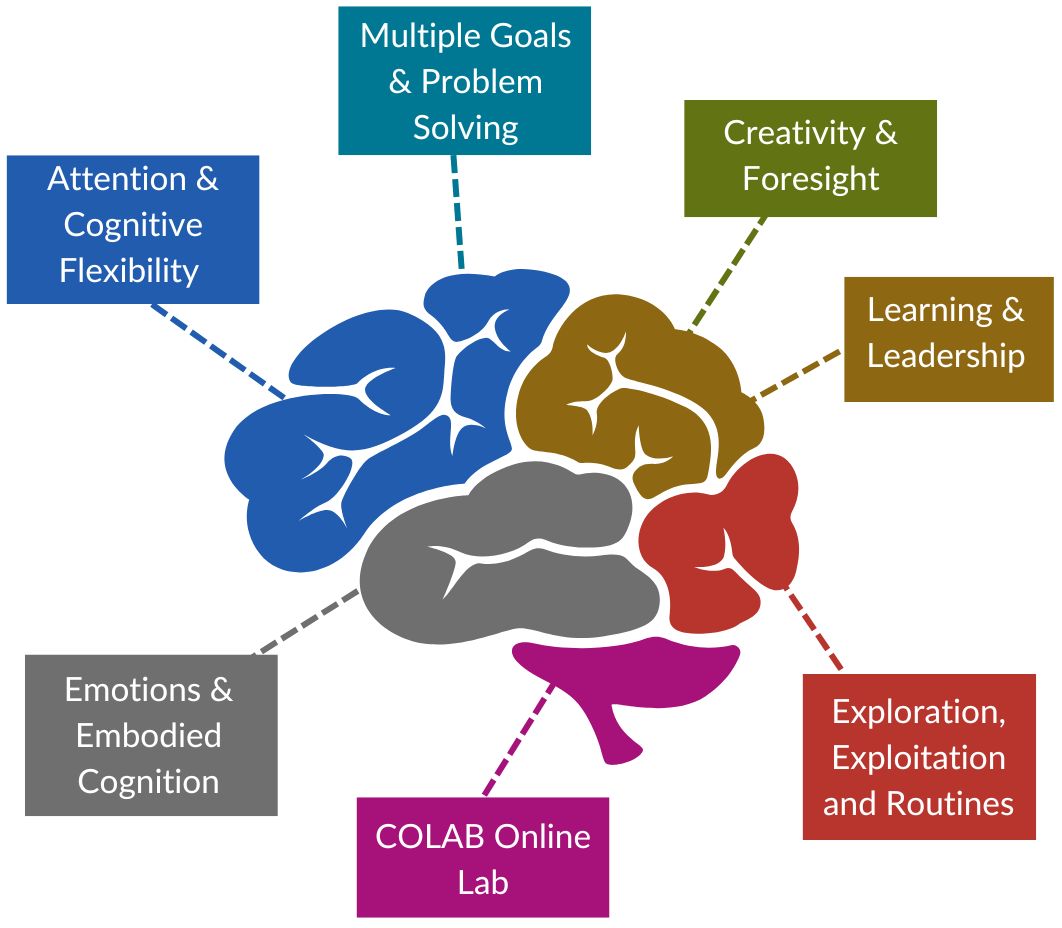Cognition Learning and Adaptive Behavior (COLAB)

The adaptive behaviour of individuals is a fundamental aspect of change and innovation. After all, it is individuals who initiate and drive change and innovation in dynamic environments. As a multi-disciplinary research group, our goal is to understand the cognitive mechanisms involved in adaptive decision-making and learning. To achieve this goal we use a combination of qualitative, experimental, neuroimaging and computational methods. Our key questions focus on how individuals can develop abilities that better allow them to manage tensions such as those between exploration and exploitation, between social and economic outcomes, between new and old ideas, and between focusing on one goal rather than integrating multiple goals. Our past and ongoing work can be classified in the following areas:
- external page Video: Laureiro-Martínez, D., & Brusoni, S. (2018). Cognitive Flexibility and Adaptive Decision-Making: Evidence from a Laboratory Study of Expert Decision-Makers. Strategic Management Journal, 39, 1031–1058.
- Download Scientific Article: Laureiro-Martínez, D. (2013). Cognitive Control Capabilities, Routinization Propensity and Decision-Making Performance. (PDF, 503 KB)
- Download Scientific Article: Laureiro-Martínez, D. & Brusoni, S. (2018). Cognitive Flexibility and Adaptive Decision-Making: Evidence from a Laboratory Study of Expert Decision-Makers. (PDF, 503 KB)
- Press: This article highlights the importance of cognitive flexibility in leadership for effective decision-making and adaptability. It details the Swiss Armed Forces' plans to incorporate these findings into officer recruitment and training to bolster crisis preparedness and leadership skills.
1. Ongoing Work: Training Cognitive Flexibility to Improve Ambidexterity
Goal: Identification of cognitive abilities favouring cognitive flexibility. Training of cognitive flexibility in order to increase individual ambidexterity in the Swiss Armed Forces.
Associated Persons: Jan Richner, Daniella Laureiro-Martinez, Stefano Brusoni, Zorica Zagorac-Uremovic and Hubert Annen (MILAK)
Methods: Behavioral experiments in lab and field using cognitive tasks, field exercises and think-aloud protocols
2. Ongoing Work: Swiss Armed Forces Sustained Attention & Other Organisations
Goal: Taking the attention-based view (ABV) to explore how attention is sustained over time, and under what circumstances, attention turns into action to enable organizational change.
Associated Persons: Tomoko Yokoi
Methods: Archival research and social network analysis
1. Ongoing Work: Conflicting Goals and Strategic Decision-Making
Goal: Examination how managers solve strategy problems that require multiple and sometimes conflicting goals.
Associated Persons: Ann Xavier, Daniella Laureiro-Martinez and Zorica Zagorac-Uremovic
Methods: Behavioral experiments combined with think-aloud protocols
2. Ongoing Work: The neural antecedents of Goals Integration
Goal: Investigation of the neural correlates of finding solutions that fulfill multiple and sometimes conflicting goals. Brain imaging techniques with experienced managers.
Associated Persons: Ann Xavier, Daniella Laureiro-Martinez, Todd A. Hare, Joseph Heng
3. Ongoing Work: Conflicting Goal Definition and Sustainable Solutions
Goal: Explanation of differences in how individuals identify conflicting goals and define problems more holistically in order to find more sustainable solutions.
Associated Persons: Daniella Laureiro-Martinez, Zorica Zagorac-Uremovic and Ann Xavier
Methods: Behavioral experiments combined with think-aloud protocols
1. Ongoing Work: How Leaders Generate Novel Business Ideas
Goal: Examination how business leaders generate business ideas and identification of cognitive processes that enhance the quality of business ideas.
Associated Persons: Zorica Zagorac-Uremovic
Methods: Case studies with retrospective in-depth interviews and cognitive ability tests
- Download Scientific Article: Laureiro-Martínez, D., Venkatraman, V., Cappa, S., Zollo, M. & Brusoni, S. (2015). Cognitive Neurosciences and Strategic Management: Challenges and Opportunities in Tying the Knot. (PDF, 212 KB)
- Press: In an interview with The European Business Review, Daniella Laureiro Martinez unveils the inspiration behind her research and she also dives into the power of cognitive flexibility and adaptive leadership. She shares how the emba X program equips leaders to thrive in a fast-changing world, blending ethical leadership with cutting-edge technology.
- Press: This article highlights the importance of cognitive flexibility in leadership for effective decision-making and adaptability. It details the Swiss Armed Forces' plans to incorporate these findings into officer recruitment and training to bolster crisis preparedness and leadership skills.
- external page Book: Co-Author on the Super Deciders Book.
- external page We are organizing the CSOL conference in May 2025
- external page Video: Laureiro-Martínez, D., Brusoni, S., Canessa, N., & Zollo, M. (2015). Understanding the Exploration-Exploitation Dilemma: An fMRI Study of Attention Control and Decision-Making Performance. Strategic Management Journal, 36 (3), 319-338.
- Download Scientific Article: Laureiro-Martínez, D., Canessa, N., Brusoni, S., Zollo, M., Hare, T., Alemanno, F. & Cappa, S. F. (2014). Frontopolar Cortex and Decision-Making Efficiency: Comparing Brain Activity of Experts with Different Professional Background during an Exploration-Exploitation Task. (PDF, 958 KB)
- Download Scientific Article: Laureiro-Martínez, D., Brusoni, S. & Zollo, M. (2010). The Neuro-Scientific Foundations of the Exploration-Exploitation Dilemma. (PDF, 1.1 MB)
- Download Scientific Article: Laureiro-Martínez, D., Brusoni, S., Canessa, N. & Zollo, M. (2013). Understanding the Exploration-Exploitation Dilemma: An fMRI Study of Attention Control and Decision-Making Performance. (PDF, 842 KB)
1. Ongoing Work: Power and Individual Ambidexterity
Goal: Exploration of the impact of perceived power on exploration and exploitation decisions.
Associated Persons: Daniella Laureiro-Martinez, Valerie Caubergh, Marie Crouzevialle
Methods: Experiments
2. Ongoing Work: Swiss Alpine Huts changing routines
Goal: Climate change affecting hut wardens routines and accelerating the need to learn how to integrate new goals into their routines.
Associated Persons: Tomoko Yokoi, Anja Niedworok, Daniella Laureiro
Methods: Field study with interviews, observations
3. Ongoing Work: Adaptive search and Aspiration
Goal: Exploring how an organization's feedback processing and goal-setting strategies influence its potential outcomes
Associated Persons: Axel Zeijen
Methods: Modelling
1. Ongoing Work: Embodied Cognition in the Age of AI
Goal: With discourse on organizing being primarily rooted in physical artifacts, the corporeal and material settings, how do these notions of embodied cognition evolve in the new context of AI and hybrid settings?
Associated Persons: Tomoko Yokoi
Methods: Interview, observations, secondary data
This space is dedicated to exploring and understanding the mechanisms behind human adaptability, learning, and cognitive behavior. To explore more click here: Online Lab
For all other questions concerning the group, please contact: Daniella Laureiro-Martínez: